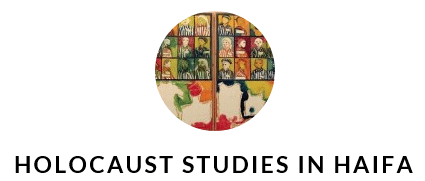 Herbert Bettelheim’s Story of Escape & Detention
Herbert Bettelheim’s Story of Escape & Detention

On December 17 our students in the Practical Training in Curating course that meets at Altit Detention Center were able to hear from a special speaker that was arranged by student Diana Schuemann.
The speaker was Mr. Herbert Bettelheim. Herbert who was born in 1921 in Vienna Austria was a violinist and he studied at the Academy of Music until the Anschluss with Germany when he was kicked out because he was Jewish and the school was closed because a majority of the pupils were Jewish.
At that point Herbert and his family were determined to leave Austria. Herbert and his brother Hans were able to leave Vienna before the outbreak of WWII and legally immigrate to Palestine, which was under British rule, to study at the Technion in Haifa. Herbert arrived in Haifa after his older brother on March 3, 1939.

Once the brothers were safe in Palestine their main goal was to bring their parents to join them. Their parents owned a store which was Aryanized and they were given only a small portion of its value. Herbert tried to arrange for legal immigration for his parents by establishing a bank account for them with enough funds to prove they would not be destitute upon arrival. However, due to the strict immigration quotas Herbert was unable to secure them legal passage and in November of 1939 his parents left Vienna and proceeded on the perilous and illegal journey to reach Palestine.
They traveled to Bratislava and Yugoslavia, where the boat broke down, as part of the journey. They were finally able to secure passage on a ship called Hilda which sailed for Palestine on January 8, 1940.
The journey was terrible; the boat was cramped, lacked ventilation, and only had two bathrooms for over 700 passengers. The British finally escorted the ship into Haifa on January 24. Herbert’s parents were arrested and detained at Atlit, the detention camp used by the British to house illegal immigrants until their release. According to Herbert this was a happy ending to the journey for his parents. They felt very lucky to reach the shores of Palestine and they knew that their lives were now safe.

Herbert found out about his parents’ plan to leave Vienna from an uncle in Switzerland. He regularly went to the office for German Jews to see if his parents were on the list of detained illegal immigrants. As soon as he saw them on the list he went to Atlit to visit them. Most of the time Herbert had to talk to them through the barbed wire fence but he was able to bring them packages and necessities. His parents were separated from each other but they were able to shower, read the newspaper, engage in activities, had enough food, and access to medical care.
Herbert’s parents were not free but they were safe and knew they would be released sooner or later. Herbert acknowledged that the detention was easier for his parents then for Holocaust survivors who were detained there after the war and whose experience was overshadowed by the forced labor and extermination camps they were held in during the war.
Herbert tried to secure his parents’ release by going to speak with the British police chief in Haifa. The police chief expressed the concern that some of the detainees could be spies for the Nazis. Herbert’s mother was released after two months in March of 1940 but his father remained for some months more and wasn’t released until June 1940.

In addition to sharing the story of his family’s escape and detention with us Herbert brought primary source documents for us to see that included his mother’s first ID for Mandatory Palestine, his father’s ID that was given to him while he was interned at Atlit, and a British government form proving Herbert requested legal immigration visas to Palestine for his parents. Herbert was an excellent speaker and our students were so fortunate to be able to hear about this important history from a survivor who lived it and had first hand knowledge about the Atlit site.
Interested in applying for our MA in Holocaust Studies Program? You can find the application and more information at our website: http://holocaust-studies.haifa.ac.il/
twoje uwagi, linki, wlasne artykuly, lub wiadomosci przeslij do: webmaster@reunion68.com
